|
|
|
Sort Order |
|
|
|
Items / Page
|
|
|
|
|
|
|
| Srl | Item |
| 1 |
ID:
100220
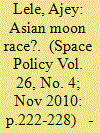

|
|
|
|
|
| Publication |
2010.
|
| Summary/Abstract |
After a gap of 40 years, the Moon is again the focus of several countries' space ambitions. Japan, China and India have already launched their first Moon missions and are expected to send humans moonwards within the next 10-15 years. This revival of lunar programmes in the post-cold war era goes beyond symbolism and is also about the race to grab the natural resources of the Moon. Such ambitious missions by these states imply that they intend to change the unipolar world into one with multiple power centres, and would use space technology as one of the components to do so. This paper examines the first phase Moon missions of the Asian states and argues that their overall deep space mission aspirations have strategic ambitions attached.
|
|
|
|
|
|
|
|
|
|
|
|
|
|
|
|
| 2 |
ID:
062206
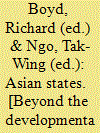

|
|
|
|
|
| Publication |
London, Routledge Curzon, 2005.
|
| Description |
xiii, 224p.
|
| Standard Number |
0415346126
|
|
|
|
|
|
|
|
|
|
|
|
Copies: C:1/I:0,R:0,Q:0
Circulation
| Accession# | Call# | Current Location | Status | Policy | Location |
| 049660 | 330.95/BOY 049660 | Main | On Shelf | General | |
|
|
|
|
| 3 |
ID:
133600
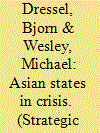

|
|
|
|
|
| Publication |
2014.
|
| Summary/Abstract |
Problems common to many Asian states suggest a pattern of crisis in Asia. The evidence suggests that the root cause is the similarity in the patterns of political development of postcolonial states. In Asia such states have attempted to reconcile state strength and internal diversity by constructing a triangular balance between identity construction, hegemonic governance and economic development. Unfortunately, this fragile balance eroded as state structures matured and economies grew, which increasingly exposed countries to escalating crises of legitimacy and instability. By highlighting changes in the postcolonial state compact within the region, this article seeks to advance both the understanding among theorists of political developments in the region and the understanding among those who govern of the roots of the current crisis.
|
|
|
|
|
|
|
|
|
|
|
|
|
|
|
|
| 4 |
ID:
129453
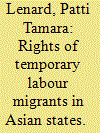

|
|
|
|
|
| Publication |
2014.
|
| Summary/Abstract |
This article considers the struggles faced by Asian states in their attempts to recruit mostly low-skilled temporary labour migrants. The article observes three trends: (1) there is a marked reluctance to admit low-skilled migrants into many Asian states, even where they are clearly needed; (2) where they are admitted, there is an associated marked reluctance to grant them an expansive set of rights, including in particular a path to citizenship; and (3) there continues to be a concern to protect the cultural basis of the nation, which serves as justification for both the reluctance to admit migrant workers and the reluctance to extend them rights. As a result of these three trends, two observations can be made. First, the presence of increasing numbers of both high- and low-skilled migrants may force Asian states to reconsider their reliance on ethno-national self-definitions. Second, however, to the extent that this reconsideration is already transpiring, it is not yet easily translating into more and better rights for, especially, low-skilled migrants, in particular with respect to the rights associated with citizenship status. The worry that migrants threaten social cohesion in Asian states, by sullying the national 'brand', prevails
|
|
|
|
|
|
|
|
|
|
|
|
|
|
|
|
| 5 |
ID:
116070


|
|
|
|
|
| Publication |
2012.
|
| Summary/Abstract |
With the burgeoning influence of emerging markets in Asia, a tectonic shift is taking place in the global security landscape. Asian states are concomitantly arming as their economic clout grows. In light of these developments, security analysts would benefit from a formal means of placing these arms acquisitions in a structural context. Are arms acquisitions on par with the expectations of Asian states, given their structural dispositions, or are recent acquisitions beyond anticipated levels? By using a dynamic panel regression of 187 states from 1950 to 2011, this research predicts arms import volume using the degree of interstate arms linkages, the size of a state's military, and its level of economic development. The technique offers analysts a formal means of distinguishing orthodox behavior in importing conventional weapons from extraneous security motivations. The article concludes by generating near-term forecasts of Asian arms imports and discussing the implications of the technique.
|
|
|
|
|
|
|
|
|
|
|
|
|
|
|
|
| 6 |
ID:
119112
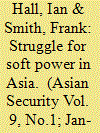

|
|
|
|
|
| Publication |
2013.
|
| Summary/Abstract |
Throughout Asia, states are competing to build and leverage soft power using public diplomacy. This article examines these investments, whether they pay dividends, and why they are being made. A mix of qualitative and quantitative analysis shows little, if any, positive correlation between public diplomacy by Asian states and foreign public opinion. We therefore ask why states invest in public diplomacy when it does not seem to work. We argue that different motives are at play: The struggle for soft power is driven by both a logic of consequences and logic of appropriateness. Lastly, we suggest how this struggle might aggravate rather than ameliorate tensions in the region.
|
|
|
|
|
|
|
|
|
|
|
|
|
|
|
|
|
|
|
|
|